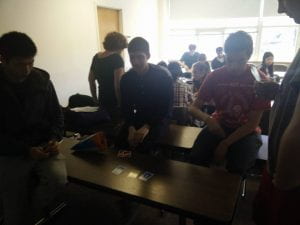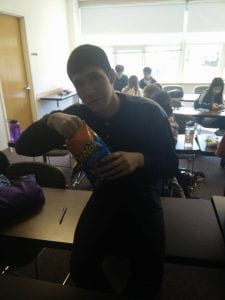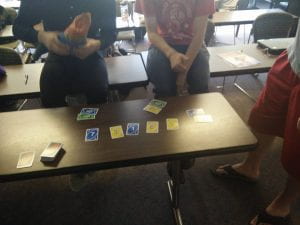Instructions:
The game is to be played with 3+ players
The goal of this game is to win the most amount of chips from other players.
- Each player is dealt 2 cards and 3 Cheetos as chips
- Place 3 cards facing up in the center of the table (these are called community cards)
- Assign a player to begin calling stakes (in number of Cheetos betted)
- Each player subsequently must either call, raise or fold
- Deal an extra card once a round of calling has been ended
- Repeat steps 4 and 5 one more time
- All players are to use their functional cards if applicable
- Remaining players show cards to determine the winner, whom takes all betted chips
The winner is determined by possessing the better hand, the rules are:
- High > Low
- Same suit > varying suits
- 3 consecutive numbers > Pair
- 3 of the same > 3 consecutive numbers
- If +2 or +4 is shown, add the respective number of cards to the community deck
- If color changing card is shown, the player may switch any card for a card in the deck
- Skip and reverse cards are not available



Ideation
I have always been an avid card game enthusiast, whether that is Poker, UNO or almost any variation of card games that involves a bit of strategy and reading the group. To me, I find it very enjoyable as it’s not strictly relied on the mastery of a skill such as professional sports, and it’s also not too random as the likes of Rock, Paper, Scissors or flipping a coin.
However, creating this game was initially very difficult simply because my mind was going through too many possible card games and I didn’t have a good starting point. Finally, I decided to reverse-engineer the ideation process and start with a theme and message instead of starting with a game to appropriate. I had a lot of fun playing around with the idea of Fluxus from my Score assignment and wanted an element of that, whilst also incorporating some of my understanding of Dada. I arrived at the conclusion that I was certain I wanted to create a multiplayer game that had both an element of skill and luck within, which is when 2 of my favorite games came to mind — Texas Holdem and UNO.
Inspiration
One of the reasons I chose this game for my final iteration is because I was very excited about the changes in the meaning. I saw this a perfect fit with the material I learned from Dada, where one is encouraged to create new meanings by presenting something to people in a new perspective. In this instance, I have turned Texas Holdem, a game known for being very strategic, calculative and detail-oriented into an unpredictable one that relies greatly on instinct. As a Business student, this is even more interesting, as I am trained to look for patterns and reduce risk, and now I am forced to embrace the unknown. In this game, neither the number of players or even number of cards is known, with the latter also being potentially subject to change during the game.
Another concept that I incorporated was the “happening” from the Fluxus. After all the cards are dealt, any wild cards held by the players (if any) directly changes the deck either by switching out cards in the community deck and players’ hands, or adding cards to the community deck. This creates a great element of surprise that cannot be planned. In regular Texas Holdem, a player knows that they have 2 cards in their hands and that they will be given 5 cards in the community to work with; whereas in this case, one could have both their cards switched out with 9 cards to play with. The unpredictability is also increased with a larger number of players.
Play-testing
Play-testing this game was very fun, with a total of 4 players and 2 rounds, there was a round with multiple wild cards and a community deck size of 9, and another round where no wild cards were shown and maintained the default size of 5. My classmates seemed to respond positively and I was very happy with the game overall.
